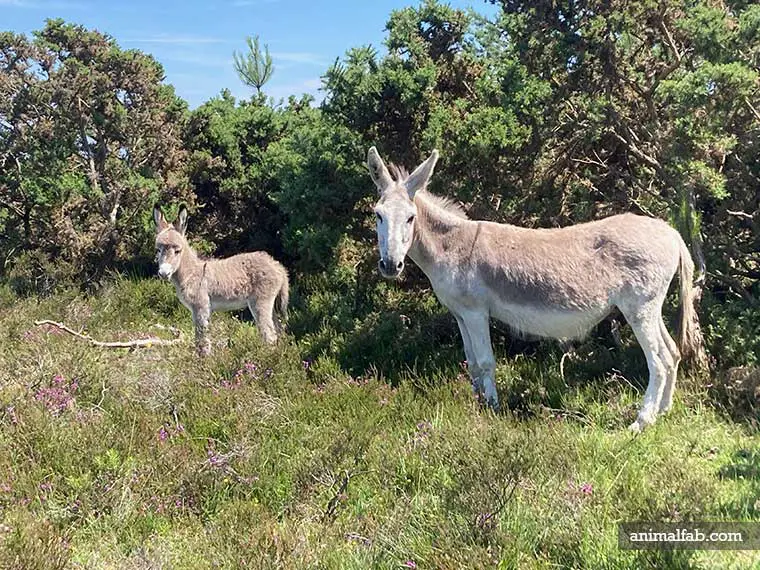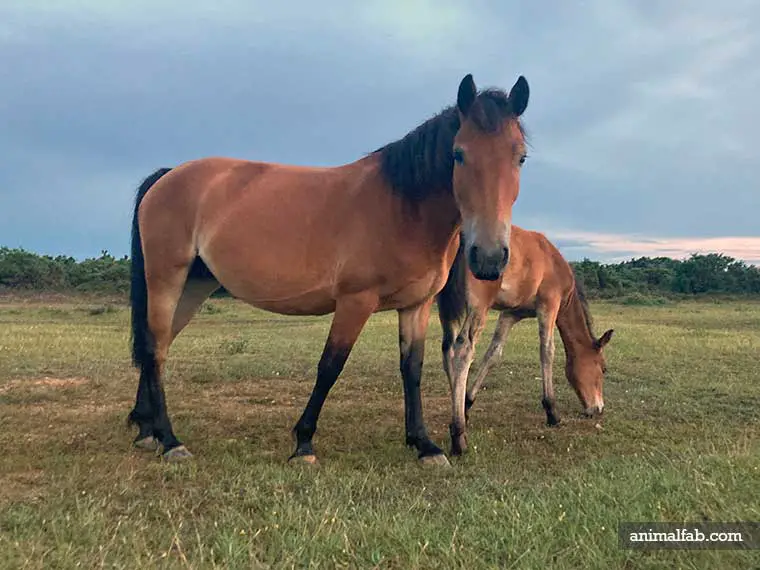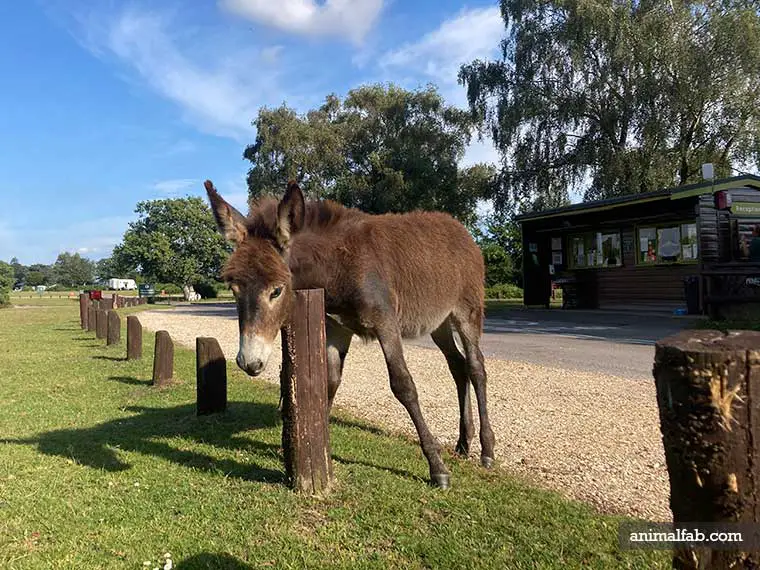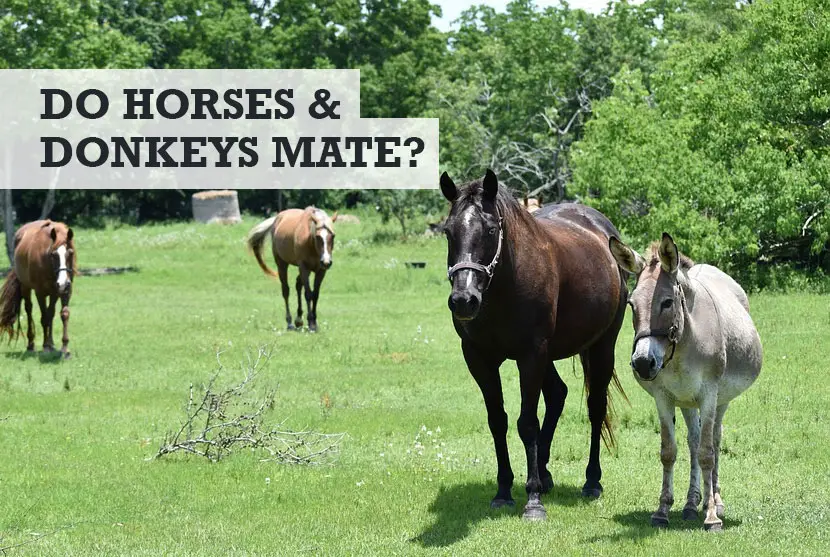We were recently driving through the New Forest on the south coast of England. It’s home to donkeys and horses who roam the forest heathland, co-existing together in apparent harmony. Seeing these two animals live so close together made me wonder whether horses can breed with donkeys, and if they did, what would the result be.
Thankfully I was able to ask our resident vet on Crittasaurus for her opinion on whether donkeys and horses mate in the wild, so here’s the expert answer.
Can donkeys and horses mate and breed? Yes, donkeys and horses can mate, with the resulting offspring being called a hinny or mule. The two species can mate naturally in the wild, although that is rare, with most inter-breeding occurring due to human intervention.
That’s the short answer from our vet, but she did go on to explain a lot more about how donkeys and horses mate which offer some interesting insight below.
Do donkeys and horses naturally mate?
Animal hybrids are not a new thing, and references to cross-species breeding have been noted since records began. One common example of a hybrid is the offspring of a donkey and a horse.

The offspring of a donkey and a horse, known as a mule or hinny, has unique characteristics which make it strong and hardy, as well as intelligent and full of “hybrid vigour”.
Do donkeys and horses breed naturally? While it is technically possible for donkeys and horses which coexist in the same environment to mate, almost all mules have been selectively bred by humans for a specific purpose.
According to the American Mule Museum, mules were first bred by an ancient civilisation in north-west Turkey. The Ancient Egyptians were also fond of using mules instead of camels as pack animals and bred them for this purpose.
Can a donkey make a horse pregnant?
A male donkey can impregnate a female horse, as well as a male horse is able to impregnate a female donkey. While the offspring of both combinations is commonly known as a mule, the latter is correctly known as a hinny. A molly mule is a female mule, and a jack mule is a male mule.
Both mules and hinnies feature the characteristic head of a donkey and extremities of a horse. Hinnies are less common than horses, and there may be some subtle differences in appearance, such as the mane and tail of a hinny are more closely resembled to a horse than the mule.

Miniature mules and draft mules can also be produced, dependant on what sort of horse is used in the mating.
For simplicity, we will refer to both mules and hinnies as mules in this article.
Handy Hint: Did you know that a racehorse’s eyes are covered with blinkers during a race due to an evolutionary trait?
Can a mule breed?
Once a horse and donkey breed, the result will be aa mule or hinny, both of who are generally sterile. This means that they cannot mate to produce further offspring.
This is because their chromosomes are not equal. Donkeys have 31 pairs of chromosomes, whereas horses have 32 pairs.
A reproductive cell contains one chromosome from each pair, so when a sperm and an egg merge together from a donkey and a horse, the resulting mule will receive 31 chromosomes from one parent’s reproductive cell and 32 from the other, resulting in one left over chromosome lacking a matching pair.
Extra chromosomes aren’t unheard of. An extra chromosome in humans can result in Down’s Syndrome, or a miscarriage, depending on the position of the chromosome.
Handy Hint: The resulting mule of a donkey and horse partnership will most likely run a lot faster than the average donkey can.

In mules, the extra chromosome causes problems in the way in which reproductive cells are produced (a process called meiosis). In addition to the extra chromosome, the chromosomes which have successfully paired up are more dissimilar than pairs resulting from two horses or two donkeys, which further complicates a mule’s ability to produce reproductive cells.
Despite this, there have been a handful cases of female mules giving birth after mating with a horse or donkey.
According to a BBC report in 2002, approximately 60 mule births have been recorded since records began in 1527. The BBC report described a story of an elderly owner of a 14-year-old mule in Morocco, who was visited by people from afar, bringing gifts and paying tribute to the surprise miracle foal.
The occurrence is so historically rare that the Romans had a saying Cum mula peperit, meaning ‘when a mule foals’, the equivalent of our ‘once in a very blue moon’,” explained Dr Gigi Kay, a horse vet with the charity the Society for the Protection of Animals Abroad, who has visited the mother and son.
Why do people breed mules from donkeys and horses mating?
Mules carry a purpose, much like horses and donkeys, and their hybrid vigour makes them ideal for some jobs which neither horses nor donkeys are right for. Mules are extremely strong and tough animals, which excel at endurance. They make excellent pack animals to carry or pull heavy loads.
They are generally very hardy and have an excellent immune system. As a result, their working lifespan is usually longer than that of a horse or donkey. This is also in part due to their lack of willingness to overwork themselves, unlike horses.
Handy Hint: Here’s all you need to know about introducing horses and donkeys together safely to reduce risks.
This can be perceived as stubbornness; however, it is a sign of intelligence. This intelligence means that they are very trainable and quick to learn. However, it also means that they pick up both good and bad habits quickly.
Mules are also easier to look after than a similar sized horse. They need slightly less food, and thrive in the paddock, rather than intensely stabled. Nevertheless, they still require the same routine health care and training as a horse or donkey.
Conclusion
To conclude, horses and donkeys can mate and are known to produce strong, intelligent offspring, known as mules or hinnies. However, the offspring are usually sterile.
Mules are almost always due to selective breeding by humans and are excellent work animals for pulling or carrying loads.
So, if like me, the next time you see wild horses and donkeys roaming, it’s unlikely you will ever see them mating. It tends to happen only with human encouragement.
You might also like…
- How to tell if your pet donkey is ready to give birth
- How to make friends with a donkey
- How many stomachs goat have might surprise you
Image in header via https://pixabay.com/photos/horses-donkey-pony-mane-mare-foal-5258789/


